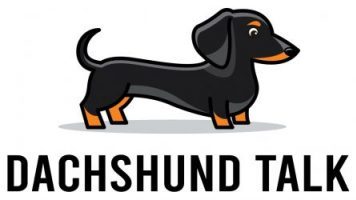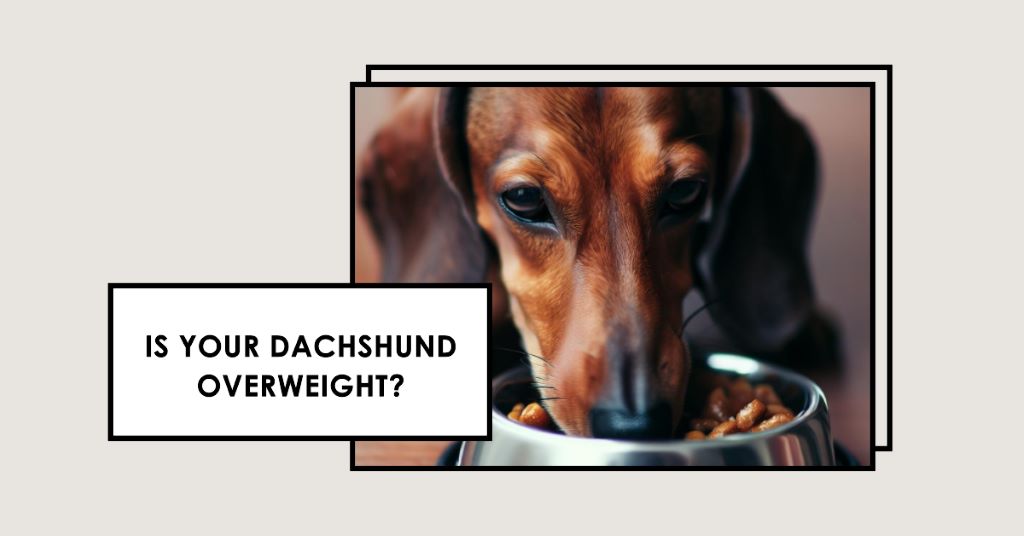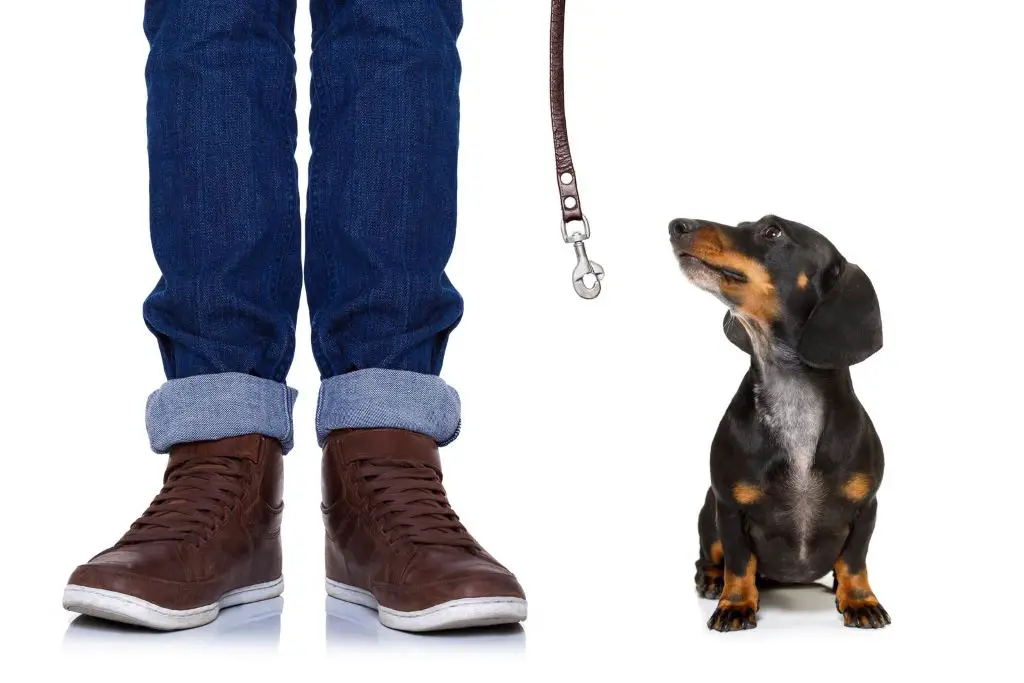Just like Goldilocks, you want your dachshund’s weight to be ‘just right.’ Neither too thin nor too fat. But how can you really tell? You’re not alone in this dilemma; many pet owners find it challenging to discern if their beloved sausage dog is carrying a few extra pounds. Obesity isn’t just about aesthetics–it poses serious health risks for your Dachshund.
This article is designed to help you better understand canine obesity, identify symptoms of obesity in your dachshund, comprehend the potential health hazards linked with being overweight, and, most importantly, provide tips on managing your pup’s weight effectively. We’ll also discuss feeding recommendations for maintaining a healthy weight in your dachshund.
So read on, because knowledge is power when it comes to ensuring the longevity and wellbeing of our four-legged family members.
Key Takeaways
- Dachshund obesity is a common and serious health concern.
- Signs of obesity include inability to see or feel ribs, waistline, and backbone, tiredness during exercise, difficulty breathing, and changes in appetite.
- Obesity in dachshunds can lead to back problems, diabetes, and heart disease.
- Regulating diet and encouraging regular exercise are key to weight management.
Understanding Canine Obesity

You’d be shocked to realize how common canine obesity is, and it’s heartbreaking to see our beloved pets suffer from weight-related issues. Understanding canine obesity starts with recognizing its prevalence and impact on the welfare of our pets. It’s not just about your dachshund being a bit chubby; this is a serious health concern that can lead to significant problems.
An overweight dachshund may appear cute with their extra rolls, but those additional pounds could be setting them up for various diseases such as diabetes, heart disease, arthritis, and even a decreased lifespan. You might think your dachshund is simply well-fed, but there’s more to it than meets the eye.
Dachshunds are notorious for their susceptibility to weight gain due to their unique body structure. An obese dachshund faces far greater risks compared to other breeds because of this characteristic build. This makes understanding dachshund obesity crucial for owners who want nothing but the best for their furry friends.
Remember that every excess pound puts more strain on your pet’s body – affecting everything from mobility to overall well-being. Be vigilant about your dachshund’s weight management, prioritizing regular exercise and a balanced diet.
Identifying Obesity Symptoms
Spotting the signs of a pudgy pooch isn’t always as clear as day, but there are telltale hints that your fur baby may be carrying a few extra pounds. Identifying obesity symptoms in your dachshund starts with a visual assessment. If you’re unable to see or feel your pet’s ribs, waistline, and backbone, it could indicate that your dachshund is overweight or obese.
Obesity doesn’t just manifest itself in an expanded waistline. Watch for changes in behavior too. An obese dog might tire easily during walks, show reluctance to exercise or play, and even struggle when getting up from a resting position. A fat dachshund might also show difficulty breathing or pant excessively after minimal activity.
Another sign of an overweight Dachshund could be changes in appetite – either increased hunger due to poor nutrition absorption or decreased interest in food because of discomfort caused by excess weight.
Remember, the best way to know if your dachshund is overweight is through regular vet checkups, where they can accurately measure and assess your dog’s body condition score and overall health status. This way, you can take appropriate steps before obesity leads to other health complications.
Potential Health Risks
Carrying extra pounds isn’t just a cosmetic issue for your pooch; it’s a ticking time bomb that can lead to serious health problems. Just like in humans, being overweight can cause numerous health issues in dachshunds. It is crucial to take immediate action when you notice any signs of weight problems.
Here are three potential health risks associated with an overweight dachshund:
1. Back Problems: Dachshunds have long bodies and short legs, which already predisposes them to back problems. Extra weight only exacerbates this, increasing the risk of painful conditions like intervertebral disc disease (IVDD).
2. Diabetes: Overweight dogs are more likely to develop diabetes, a chronic condition that requires lifelong treatment.
3. Heart Disease: Carrying excess weight puts pressure on your dachshund’s heart, leading to serious health complications such as congestive heart failure.
Reducing your pet’s weight will not only make them happier but also minimize these potential risks. Remember that prevention is always better than cure – maintaining a healthy diet and regular exercise right from puppyhood can prevent these issues from arising in the first place. Be conscious of their lifestyle habits because being overweight should never be considered normal for your beloved dachshund.
Weight Management Tips
So, how can you ensure your adorable long-bodied friend stays fit and healthy? Here are some weight management tips that can help your dachshund maintain a healthy weight and possibly reverse any indication your dachshund is overweight.
Firstly, regulate their diet. Feed them high-quality dog food in the right proportions. Avoid giving table scraps or too many treats as they tend to be high in calories.
- FORMULATED FOR PUREBRED DACHSHUNDS: Royal Canin Dachshund Puppy Dry Dog Food is designed to meet the nutritional needs of purebred Dachshunds 8 weeks to 10 months old
- SPECIALIZED KIBBLE: Unique kibble shape helps Dachshund puppies pick up and chew their food
- HEALTHY DEVELOPMENT: An exclusive complex of antioxidants including vitamin E promotes puppy development of the immune system and natural defenses
- BONE AND JOINT: Appropriate levels of calcium and phosphorus provide joint and bone support to help aid a small dog’s tiny limbs and a long backbone
- DIGESTIVE HEALTH: Puppy dog food supports digestive health and promotes optimal stool quality with highly digestible proteins and precise fiber
Secondly, encourage regular physical activity. Whether it’s a quick game of fetch or an evening walk around the neighborhood, keeping them active is crucial for their overall health.
Here is a simple guide to help your dachshund:
| Action | Benefit |
|---|---|
| Regular Vet Checkups | Helps monitor weight, detect early signs of obesity, and provide personalized advice on diet and exercise |
| Controlled Diet | Prevents overeating, promotes balanced nutrition, and helps maintain an ideal weight. Consider a diet formulated for weight control |
| Daily Exercise | Treats can be high in calories. They should make up no more than 10% of your dog’s daily caloric intake. |
| Limit Treats | Regularly weighing your dog can help you notice any weight gain early. This can often be done at your local vet clinic. |
| Regular Weigh-ins | Prevents overeating, promotes balanced nutrition, and helps maintain an ideal weight. Consider a diet formulated for weight control. |
| Mental Stimulation | Certain supplements, as recommended by a vet, can support overall health and aid in weight management. Always consult with a vet before starting any new supplement regimen. |
| Monitor Body Condition | Mental exercise can help reduce anxiety and prevent overeating. This can include puzzle toys, training exercises, and socialization. |
| Supplementation | Promotes muscle tone, aids digestion, and helps burn excess calories. The type and amount of exercise should be appropriate for the dog’s breed and age. |
Adopting these strategies can put your dachshund on the path to successful weight loss. Remember, it’s not just about aesthetics; being overweight can lead to numerous health problems for our four-legged friends. So take action today for a healthier tomorrow for your precious pet! It’s time to say, ‘help my dachshund’ by ensuring they thrive at their ideal weight.
Feeding Recommendations
Feeling overwhelmed with the myriad of dog food choices out there? Let’s simplify things with some feeding recommendations tailored just for your long-bodied buddy. Understanding what and how to feed your dachshund can make a big difference in their overall health and weight management.
First, choose a high-quality dog food designed specifically for small breeds. These foods are generally formulated to meet the nutritional needs of smaller dogs like dachshunds. Be cautious of filler ingredients that offer little nutritional value. Quality protein, healthy fats, and complex carbohydrates should be at the top of the list.
Next, portion size is critical in controlling your dachshund’s weight. Overfeeding is common among pet owners and can lead to obesity. Stick to the feeding guidelines on your chosen dog food packaging but consider reducing portions if you notice unwanted weight gain.
- Precise measurement: weigh up to 11 lb; Increments: 0.1oz/1g/1mL; minimum weight recommendation: 5 g
- Multifunctional: quickly convert units between oz, lb: oz, g, mL, and fl'oz. Include water and milk volume measurement modes with refined accuracy
- Easy Tare: features tare and auto-zero functions for easy compatibility with other containers; measure in a mug, plate, or different sized bowl with dependable and hassle-free accuracy
- Practical Bowl: detachable bowl design, free mix ingredients, easy storage in small size, be used as a space saving protective cover and directly measure without the bowl
- Versatile: high range of applications including food, ingredients, milk, grains, button, chemicals and pet. Perfectly for food portion, diet, weight loss and meal prep
Also crucial is limiting treats or extras outside regular meal times; these easily add up unnoticed! Make wise choices when giving your dog snacks; opt for low-calorie options or vegetables like carrots.
Remember that each dachshund is unique, requiring different dietary needs depending on their age, activity level, and health status. Regular vet checks will help ensure you’re feeding properly for optimal health without tipping scales towards being overweight.
Maintaining Healthy Weight
It’s concerning to note that, according to the Association for Pet Obesity Prevention (APOP), an estimated 56% of dogs in the United States were classified as overweight or obese in 2020. A fit and healthy dachshund is not just about looks or avoiding teasing from other pet owners. It’s about ensuring they have a good quality of life and reducing their risk of developing serious health problems.
Maintaining a healthy weight in your dachshund involves proper feeding practices as well as regular exercise. Regular walks, playtime, and even controlled swimming can help keep your doxie active and at their proper weight. Also crucial is keeping track of your dachshund’s weight regularly. This doesn’t mean you need to weigh them daily but monitoring their body condition score can give valuable insight into whether they’re at an ideal weight or if some dietary adjustments need to be made.
Remember, every dog is different. What may be normal for one might not be right for another. Always consult with your vet when it comes to determining what the best plan for your specific pup might be. After all, we only want them to lead happy and healthy lives!
Frequently Asked Questions
What is the average weight of a healthy Dachshund?
The average weight of a healthy dachshund depends on its size. Standard dachshunds typically weigh between 16-32 pounds, while miniature ones usually range from 8-11 pounds. It’s important to consult your vet for precise measurements.
How quickly can a Dachshund gain weight?
Ever considered how fast your dachshund can pack on pounds? It’s surprisingly quick! Dachshunds, like most dogs, can gain weight rapidly if not monitored. A few extra treats or less activity can result in noticeable weight gain.
Does the breed of my dog affect its susceptibility to obesity?
Yes, your dog’s breed can affect its susceptibility to obesity. Certain breeds, like Labradors and Beagles, are more prone to weight gain. It’s essential to monitor their diet and exercise regularly to maintain a healthy weight.
Are there any specific exercises that can help my dachshund lose weight?
Wondering how to help your dachshund shed a few pounds? Try regular, low-impact exercises like swimming or walking. These activities are perfect for their long bodies and short legs. Don’t forget to reward with healthy treats!
How often should I monitor my Dachshund’s weight?
You should monitor your dachshund’s weight regularly, ideally every two weeks. This will help you track any changes and respond quickly if they’re gaining or losing too much weight. It’s part of responsible pet care.
Conclusion
In conclusion, don’t let your dachshund’s weight issue become the elephant in the room. It’s crucial to keep an eye on their size and act quickly if they’re packing on the pounds. Remember, a healthy diet and regular exercise aren’t just for humans; they’re your dachshund’s best bet at maintaining a healthy weight too. After all, prevention is better than cure!











